20679 - EUROPEAN POLITICS: BETWEEN TECHNOCRACY AND POPULISM
Course taught in English
Go to class group/s: 31
Advanced: Lezioni erogate in modalità sincrona e asincrona in aula e a distanza
This course will be held jointly with IE University, Madrid (Professor Nikitas Konstantinidis ) and has been developed within the framework of CIVICA, an alliance of ten leading European higher education Institutions in the social sciences co-funded by the European Union under the Erasmus+ programme. European politics occurs in national capitals and in Brussels. Traditionally much of the disciplinary focus has either been on the European Union and integration (International Relations/EU studies) or the national politics in the Member States in a comparative perspective (Comparative Politics). Increasingly, this failure to adequately explore how both levels of government interact reflects neither the state of European politics nor the cutting edge of research. The mission of this course is to introduce students to national and EU politics using a coherent analytical framework focusing on democratic delegation within multilevel politics. The course will draw on cutting edge research from all areas of European politics to understand some of the most important challenges that national and EU institutions and policy-making face today, such as enlargement, Euroscepticism, political fragmentation, the limits of technocratic government and the rise in populism.
The course introduces students to a basic toolkit used by researchers of advanced democracies and international interdependence (including spatial models, veto players, two-level games etc.) to understand both domestic and EU-level politics in Europe. The course is structured in two blocks. The first block introduces theoretical models of democratic delegation, political interdependence and electoral politics. The second block focuses on European policy-making and enlargement.
As might be expected for topics as broad and complex as these, while there is much we currently know, many debates are still open. The objective of this course is to weigh the available evidence – both descriptive and causal – to arrive at the fullest possible understanding of key themes within European politics today.
- understand the key theories trying to understand and explain democratic delegation and multilevel politics in Europe;
- understand the institutional structure, policy-making and electoral politics of European Union and its member states;
- understand the most important challenges that national and EU institutions and policy-making face today, such as enlargement, Euroscepticism, increasing political fragmentation, the limits of technocratic government and the rise in populism.
- use the theoretical and empirical insights presented during the course to assess and interpret the behavior of citizens, politicians and other political actors in Europe through the theoretical lenses of democratic delegation and multilevel politics;
- use the theoretical and empirical insights presented during the course to outline the key political challenges and risks facing the European Union and its member states.
- use the theoretical and empirical insights presented during the course to develop policy scenarios that allow for insights into how to address some of these key political challenges and risks in the future.
- Face-to-face lectures
- Online lectures
- Case studies /Incidents (traditional, online)
- Individual assignments
Lectures will be structured according to the standard format: the instructor will present and elaborate on the material contained in the required readings, which the students will have read before class, so as to enhance in-class discussions and students’ participation.
In order to facilitate a deeper understanding of the lecture materials, students will agree with the instructor a case study to prepare as an individual assignment.
Attendance
Some of the assigned readings will feature a high degree of knowledge and sophistication in terms of theories of politics and methods of analysis. Therefore, students’ attendance is strongly recommended. Although no formal prerequisites are required, the lectures will provide students some background that will help them gain a better understanding of the readings.
The attendance will be measured by the specific app available to all students.
| Continuous assessment | Partial exams | General exam | |
|---|---|---|---|
| x | |||
| x | |||
| x |
Attending and non-attending students: The required readings for this course will be scientific articles and book chapters that represent the key and/or state of the art contributions to the different topics analyzed. A complete list of the required and suggested reading will be provided in the course syllabus at the beginning of the course and will be available on Blackboard.





